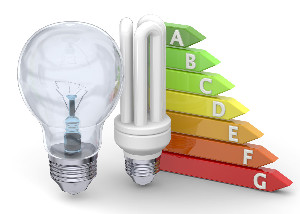Efficient energy use, sometimes called energy efficiency and energy saving the purpose of reduce the amount of energy required to provide products and services.
Energy efficiency and energy saving at a level that can be described as the energy consumption for this service and these are usually to develop this relationship.
Technical specifications energy efficiency improved energy delivery mechanism means a different type of energy, but may include the improvement, management, or organizational power.
Energy is interconnected with socio-economic development, so it is not hard to imagine this trend can be a tool for political purposes, except the energy sector. Some results may be difficult this concept may be attributed to the result or indirect chaining actions.

However, the effect of energy efficiency and energy saving measures are acceptable, different economics, different areas often at the same time in a single field may have an effect on both the direct effects on the economy else.
Traditionally, the main focus is in this area, and use less energy-the same energy services. However, this increase in the scope of the services consumed, the same amount of energy.
Therefore, energy efficiency can be obtained when the same or less energy consumption or the energy consumed to provide the same level of service for a higher level of Service. The event can be focused on energy efficiency and energy saving firstly:
- rational energy consumption;
- energy-saving mode.
Represents an important dimension of energy efficiency and energy saving, reduce waste and target activities such as the production of electricity or increased industrial activities. Both forms are important.
You mean the wave effect that may occur as a result of energy efficiency and energy saving can be useful for all of the economy-oriented development policy.
Here the various benefits of the efficient use of energy and individual/industry/public/international typology. Numerous benefits of energy efficiency and energy saving: a wide range of important benefits that can give your increasing sector.
The list is more extensive, numerous advantages can be obtained by using these measures:
Benefits increased energy efficiency and energy saving
Health and welfare
Especially persuasive with proven positive effects on energy efficiency and energy savings in the residential sector, social and environmental impacts that are associated with human health. Various diseases, especially respiratory diseases and asthma among children, closely cold temperatures, damp and moldy area.
In the sector of energy efficiency and energy saving, the buildings can bring a wide range of tangible health benefits, especially residents, houses, office workers, and other groups and the general population. Health effects associated with housing and equal ineffective is equipped with household appliances.
A struggle with energy poverty and accessibility
High energy prices and financial constraints of the poor often can't afford enough service to maintain healthy living conditions, you have to have enough work, home, bear, bad indoor air quality and/or other necessities for cooking, such as food, a phenomenon sometimes known as “heat or eat”. This situation usually described as “fuel poverty”. Energy efficiency and energy saving to reduce household expenditures on the level of taking measures to solve this problem can be by electricity insulation and design, procurement, effective tools, equipment, heating, and water heating, and lighting, as well as learning among the inhabitants of the efficient use of energy.
Human energy is essential to exit poverty by allowing access within the body of raw materials for socio-economic development. Measures to increase energy efficiency, energy suppliers, up to ten additional free resources by reducing technical losses in energy production and distribution systems.
Industrial productivity and competitiveness
There are many improvements to provide industrial performance, energy production and energy saving. These include, increased profit, safer working conditions, continuity, and quality improvement, and product version, reduced capital and operating costs and reduces the consumption, scrap and energy. The gain can be obtained in the industry, which increased competition at the global level and spread of the daily working conditions, safety and job satisfaction of individual workers.
Advantages for suppliers energy and infrastructure

At first glance it may seem contrary to the commercial interests of energy suppliers in energy efficiency and energy savings. However, the studies have many advantages in terms of providing its customers with energy providers to get higher-quality energy services reduce operating costs and increase profits.
10 % of all the benefits of measures to increase the nature, possibly, will accrue directly to energy suppliers, explains, many demand management measures you are already taking ambitious public service is the incentive, in many countries the legal obligations in this area.
Increase in asset value
There's some evidence, ready to pay rent and for sale real estate for investors and the premium for the best energy indicators.
For example, most energy of the highest offices of the operating costs, therefore, net present value, future energy cost savings can be added to the sales. Research shows that more reflects the market every day, that mind.
Existing analyses, data shows, ”Yesil” of buildings, increased cost, sales and also rental fees offer a wide range of benefits of being outside even more value: than they have higher employment, greater comfort, lower capital costs and lower operating rates and higher performance increase.
Job creation
The investment programme for energy efficiency and create a significant potential for energy savings within a short time of the work to perform. A sky can be explained by direct and indirect employment programs that develop due to the development indicators as job creation, in addition to other breaks due to excessive consumer spending, such as reducing the state budget for unemployment benefits. Direct employment created through the implementation of energy efficiency measures and energy savings can be measured easily for most, and probably there will be a lot of them. Indirect employment can also be created in the production of raw material, however, this time you can continue to work just a specific program.
The reduction of public expenditure in the public sector as a separate subject, a prospect with Energy Economics. The load reduction and energy savings energy efficiency improvements that will contribute to improvement of national budgets and financial balance.
Energy security
That plays a role in energy efficiency meet their needs for imports as a reduction in the country and, therefore, promote the formation of various energy balance. Results, influence, energy security, structurally dependent of the energy sector in a particular country.
Macroeconomic effects
Energy efficiency and energy savings that can cause important positive macro-economic effects such as increased GDP, trade balance, restructuring, economy, employment and national competitiveness. Them which can have a significant impact on the country's budget. Capital investments in this direction, we recommend energy and less power-consuming activities.
This can have serious consequences for economic and energy management on an overall basis, re your translation suggests the economy is a more laborious process.
Reducing greenhouse gas emissions
For energy savings and energy efficiency improvements to reduce energy consumption, fossil fuel and greenhouse gas emissions. Indeed, the measures are expected to contribute to 44% carbon reduction targets for 2035 to get a chance to be in the international climate change.
In comparison with other measures to reduce greenhouse gas emissions, improve energy efficiency is often more cost-effective and fast feasible. The reduction of emissions, usually measured energy efficiency measures already recognized as one of the basic and already sees itself as the result, while existing programs.
Declining energy prices

Declining energy prices, as determined by a variety of factors-level energy supply, energy demand and trade conditions on Sunday. Other conditions being equal, to decrease the demand, energy prices should fall, and expected energy saving and energy efficiency improvements and energy demand reduction.
Natural Resources Management
Another advantage is reduced energy demand, easing pressure on Natural Resources.
Considering the world's production of crude oil in the year 2035 normal decreases energy efficiency and energy saving will be an increasingly important measure to reduce pressure supplies are limited. The achievements of International Development Goals for Sustainable Development task, and access to modern energy within the body is very important to ensure that basic life needs, as well as conditions of socio-economic development.
























